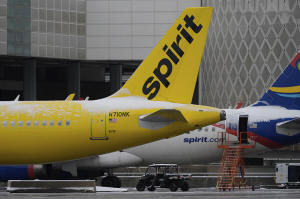Spirit Airlines exits bankruptcy protection as travel demand slows
[March 14, 2025] By
WYATTE GRANTHAM-PHILIPS
NEW YORK (AP) Discount carrier Spirit Airlines has emerged from
bankruptcy protection.
The budget airline known for its no-frills, low-cost flights on a
fleet of yellow planes said Wednesday that its parent, Spirit Aviation
Holdings, exited Chapter 11 after finalizing debt restructuring. The
reorganization plan, which received the court greenlight last month,
aims to bring the carrier back to profitability and boost resources to
compete with rivals.
Were emerging as a stronger and more focused airline, CEO Ted
Christie, who will continue to lead Spirit post-bankruptcy, said in a
statement.
The restructuring deal allows Spirit to convert $795 million of its debt
into equity. The company says it's also received a $350 million equity
investment from existing investors to aid future operations.
Spirit filed for bankruptcy back in November, following years of
struggles and mounting debt as it failed to bounce back from the
COVID-19 pandemic. The Florida carrier was particularly hit hard by
rising operating expenses and stiffer competition. By the time of its
Chapter 11 filing, the airline had lost more than $2.5 billion since the
start of 2020.

Whether Spirit will continue as a standalone airline has also been up in
the air, although takeover attempts from budget rivals like JetBlue and
Frontier have proven to be unsuccessful before and during the bankruptcy
process. Spirit rejected a third bid from Frontier last month.
While future merger proposals may not be entirely off the table, Spirit
signaled Wednesday that it would continue to focus its own growth and
offerings. Christie noted that the airline would be "moving forward with
our strategy to redefine low-fare travel with our new, high-value travel
options.
[to top of second column] |

Spirit Airlines planes parked at the closed George Bush
Intercontinental Airport, Jan. 21, 2025, in Houston. (AP Photo/David
J. Phillip, File)
 In an evolution from its
budget-exclusive roots, Spirit is attempting to tap into the growing
market for more upscale travel. It is now offering flight options
with tiered prices, the higher-priced tickets coming with more
amenities. Last year, months before filing for Chapter 11, Spirit
decided to sell bundled fares that include a bigger seat, priority
boarding, free bags, internet service and snacks and drinks.
In a message sent to Spirit customers Wednesday, Christie continued
to point those four travel options from the airline, which he said
let you choose how you want to fly."
Wednesday's announcement also noted plans to trade shares publicly
again, although not immediately. Shares of Spirit previously issued
by Spirit Airlines Inc. was canceled upon its exit from bankruptcy
but it expects to re-list shares, newly-issued under new owners, as
soon as reasonably practicable.
Meanwhile between wider economic turmoil, high-profile plane
crashes and other consumer uncertainty major airlines have issued
warnings in recent days about falling demand. Carriers like Delta,
Southwest, American have all recently downgraded revenue outlooks
for the first quarter.
All contents © copyright 2025 Associated Press. All rights reserved |